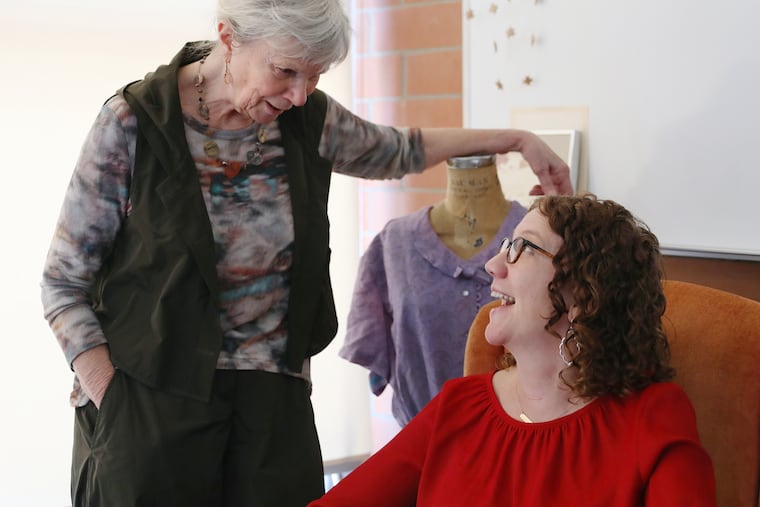The giant career mistake I would’ve made if I hadn’t trusted my mentor | Opinion
In a world where academics are often more about competition and resumé-burnishing than the joy of learning, Ruth Ost urged students like me to slow down and think about what would fulfill them.

Ruth Ost saved me from becoming a pharmacist.
I was 18, a Philly kid, daughter of a preschool teacher and a postal employee, fully on my own for paying for college. I needed a way to support myself, and somehow becoming a pharmacist seemed a lot more practical than becoming a journalist, a job held by exactly no one I had ever met in real life.
I had no particular interest in pharmacy other than it seemed like a stable field that paid decently, and the career path was clear.
Never mind that writing for me had always been as natural as breathing, that when my fourth-grade teacher asked us to compose essays about what our dream jobs were, I didn’t hesitate: “I want to be a reporter at The Philadelphia Inquirer,” I wrote.
When I marched into Ost’s Temple University Honors Program office in 1996, I told her I had declared a journalism major, but it wasn’t going to work out. I asked for her help switching gears.
To her credit, Ost did not tell me I was out of my mind.
Instead, she did what she has done for thousands of young people: She showed me things about myself I did not yet see. She encouraged. She illuminated. She reassured. She cheered. And here I am, 20 years into a career at The Inquirer.
Ost spent her first act as an acclaimed high school English teacher in Michigan. Then she earned her Ph.D. in religion at Temple at age 49 — “not the optimal time to look for a new job,” she notes — and then happened, in 1995, into a job at Honors. On Ost’s watch, the program blossomed from 400 students to more than 2,000, many of whom were drawn by the warm, eclectic community Ost created as much as they were by the intellectual opportunities Honors affords.
She retires this month, 26 years into leading Honors, and it’s got me thinking: How many young people has she listened to, sorted out, mentored? How can we adequately thank people like Ost, who showed up for me at a time when I was figuring out how to find my way in the world? She wasn’t my parent, but she believed in me. She wasn’t even my professor, but she taught me lessons I badly needed to learn.
After COVID-19 and the year-plus we’ve had, I think mentors like Ost will be especially important as young people find their way through the world.
Hazim Hardeman got the full Ost treatment, too. He was busy applying for graduate school when Ost insisted he go the fellowship route. Apply for a Rhodes scholarship, she told him. He wasn’t sure, but she persisted.
Hardeman ultimately heeded her advice, and in 2018 became Temple’s first Rhodes scholar.
» READ MORE: College once seemed unlikely for Hazim Hardeman. Here’s how he became CCP and Temple’s first Rhodes scholar.
Ost is “able to see not only capabilities in people, but paths for them,” Hardeman said. “She can speak so confidently about your abilities that you believe those things.”
In a world where academics are often more about competition and resumé-burnishing than the joy of learning, Ost urged students to slow down and think about what would fulfill them.
When Alex Ennes encountered Ost, she was locked into becoming an attorney.
“Society told me I should pursue what was lucrative, but Ruth immediately knew I wasn’t super into it for myself,” said Ennes, a 2019 Temple graduate. “Ruth told me instead of being a lawyer I should just be happy.”
Ennes ran through a dozen possible careers before she settled on an English major, then got hit by a bolt of lightning when she took — at Ost’s suggestion — a course on the geology of national parks.
“I just fell head over heels in love with geology,” Ennes said. Though she had never considered a career in science, Ennes had just enough time to squeeze in a geology minor. Ultimately, she didn’t become a lawyer, she became a park ranger — first, at Badlands National Park, now, at Acadia.
Ost’s eyes got a little misty when I tried, tentatively, to fumble around what she has meant to me, to so many.
Though I don’t have a Ph.D. in religion and I never advised students or ran a university program, our jobs had many parallels, Ost said: Mostly, we both just asked people to tell us their stories.
“It’s dazzling,” Ost said. “When I think about this batting lineup of students that I have known — what a privilege to even know these people.”